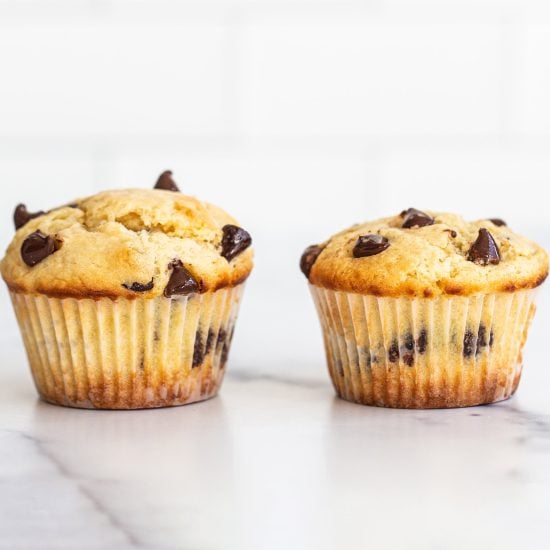
How to Bake Tall Bakery Style Muffins
This post may contain affiliate links. Read our disclosure policy.
Today I’m sharing my top tips and insights into the science of beautiful tall muffins.
You know the ones: a gorgeous mountainous dome with a defined muffin top that looks like they belong on the shelf of a fancy bakery.
That’s what you’ll be baking up after you read this article! Your friends will ask you where you bought those muffins from.
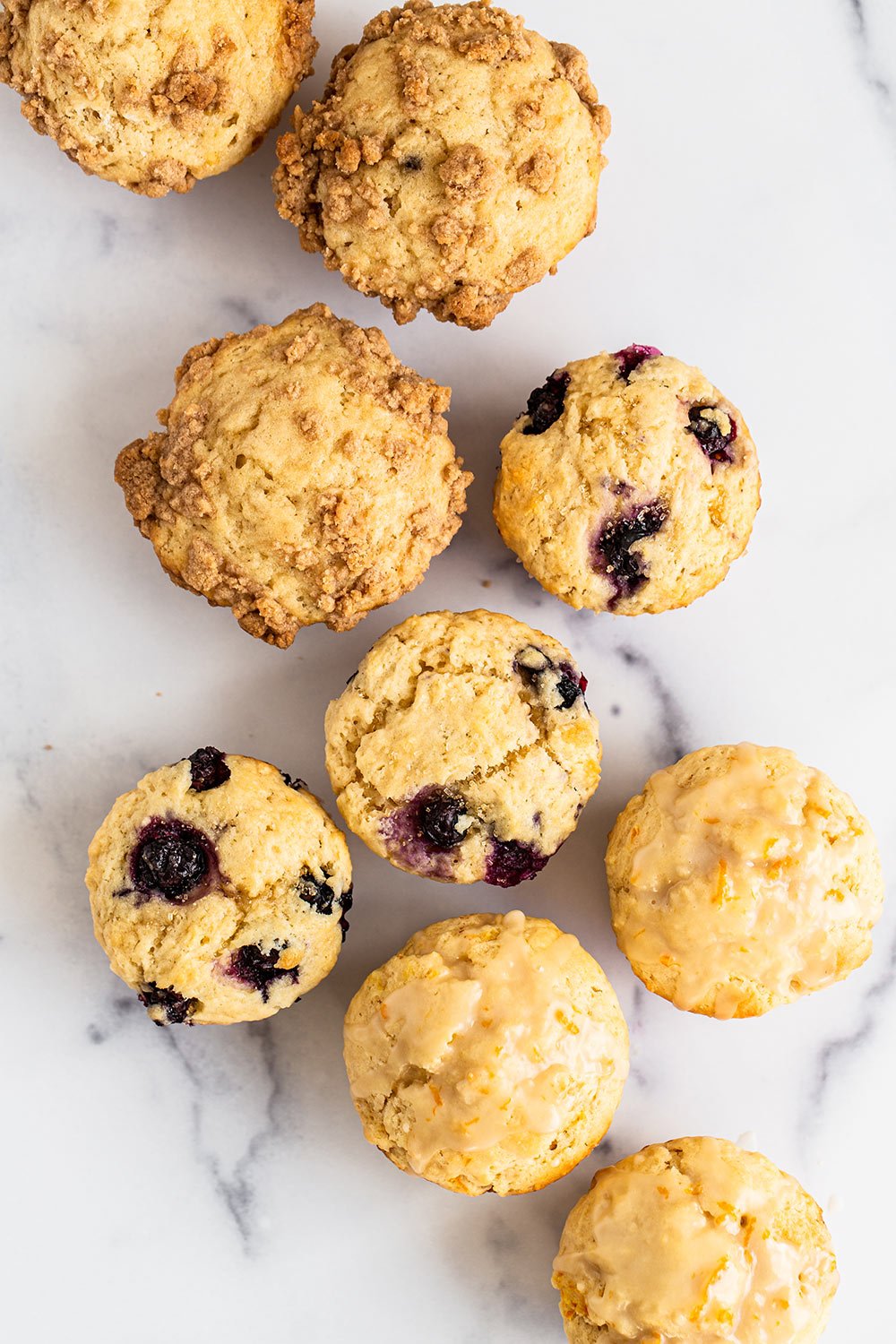
How to Bake Extra Tall Bakery Style Muffins
Option #1: Overnight Batter Rest (my favorite!)
- Chilling your muffin batter overnight in the fridge is the BEST thing you can do for amazing muffins.
- It makes them more moist, tender, and TALLER!
- It’s very similar to chilling cookie dough, which if you know me you know I’m obsessed with chilling cookie dough. Think of it like marinating.
- By chilling the batter, the starch in the flour is able to absorb more moisture, resulting in a more tender muffin.
- It also thickens the batter without drying it out, which helps encourage beautiful tall muffin tops without a crumbly or cakey texture.
- The flavors intensify and improve as well!
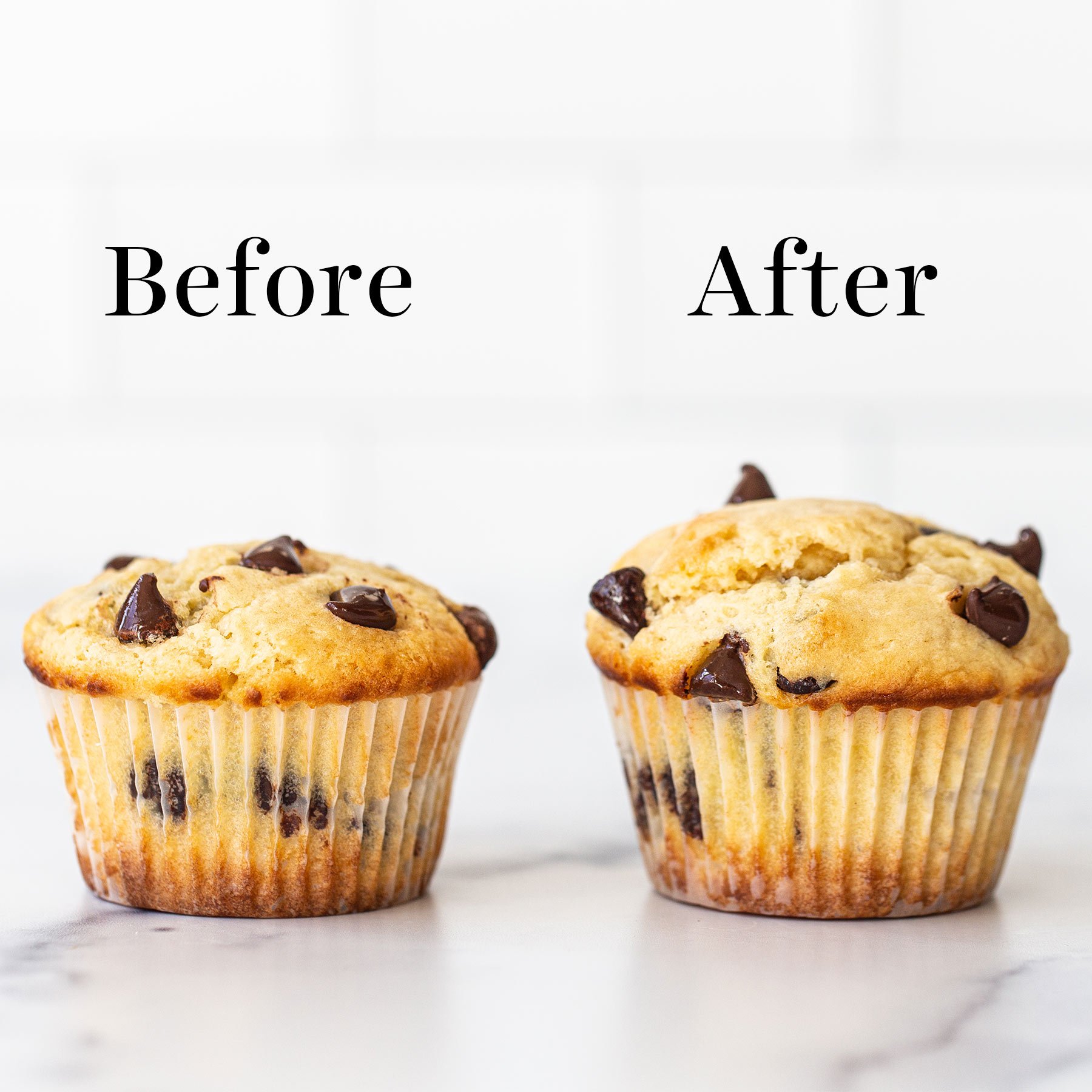
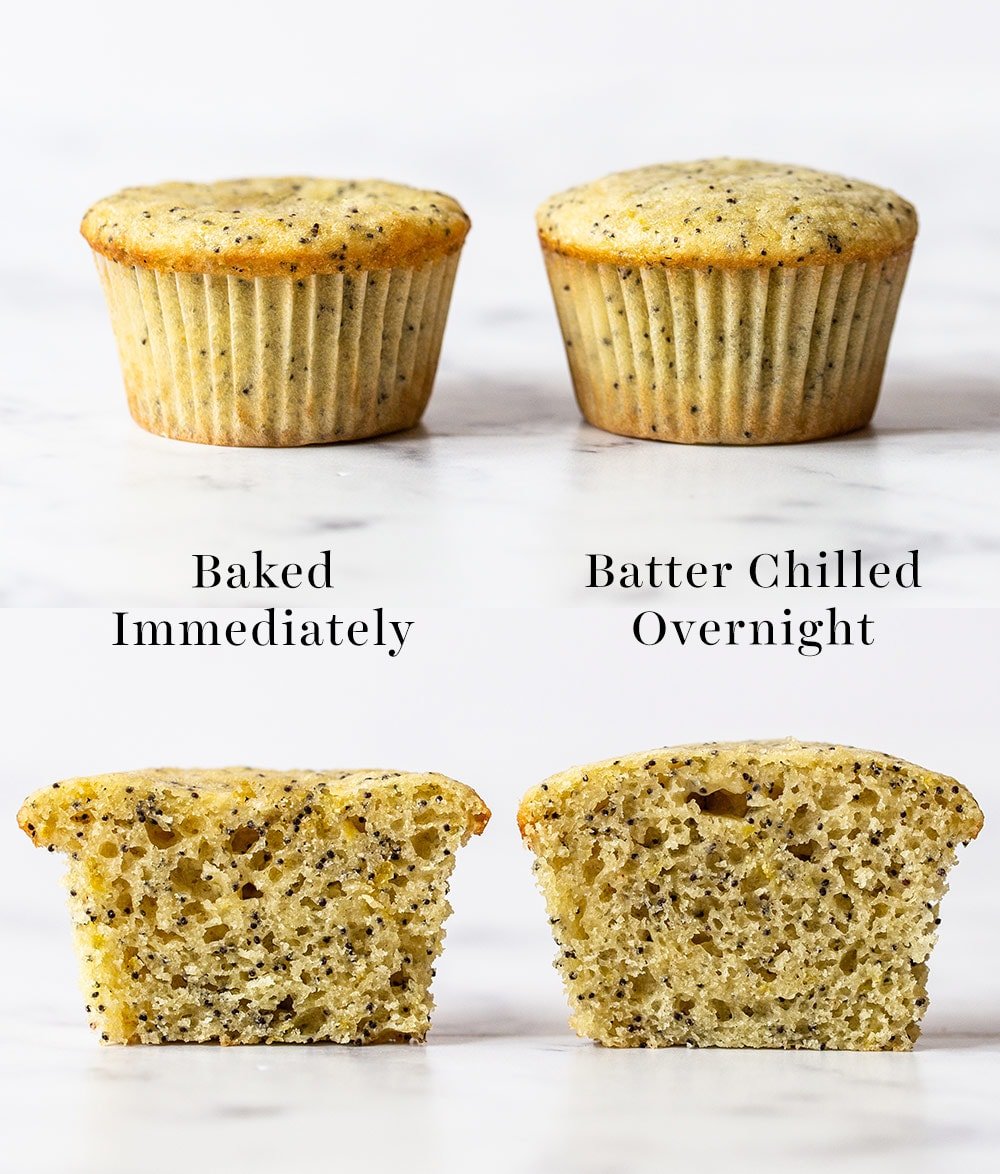
Directions for Overnight Resting
- After mixing your batter, simply cover and chill in the fridge overnight before baking. No need to bring to room temperature before scooping into your muffin tin and baking.
- I prefer to rest the batter in one bowl instead of portioning out the batter into the muffin tin, then chilling. I believe the latter is more likely to dry out the batter and it doesn’t allow the flavors to meld together as nicely.
- Look at the pictures above to see just how much this technique improves the height of the muffins. But what you can’t see is how much more tender they are!
Before Overnight Resting Batter, Check Your Baking Powder
- Double-acting baking powder is necessary when chilling batter. Double-check your container, especially if using aluminum free!
- Aluminum-free baking powders primarily react only with liquid and not with heat, which makes them react more quickly to your batter than most double-acting powders. With aluminum-free baking powder, you will need to bake your muffins right away, as the longer you wait, the less rise you’ll get.
- However, if you use a brand like Argo, which is aluminum-free but double acting, you’re good to go!
Does This Work For All Muffin Recipes?
- This will work for all muffin recipes containing baking powder as the leavener.
- Baking powder is double-acting so it activates upon being mixed with liquid and when it hits the heat of the oven.
- Baking soda only acts upon being mixed with something acidic (like brown sugar). The baking soda in the batter will lose strength the longer it sits before being baked.
- You can chill batter containing both leaveners in the fridge if you’d like to get a jump start on breakfast or brunch the night before, but you’ll likely lose a little browning on the muffins while they bake.
- If you’re curious about learning more about baking soda vs. baking powder, click here!
For Fruit Muffins (such as berries, apples, etc.), Should You Add the Fruit Before or After the Overnight Chill?
- Add fruit to the mixture just before baking.
- The juice of your fruit will more than likely bleed into your muffin if you put it in too early.
- To prevent your fruit from sinking to the bottom, spoon a little bit of plain batter (before adding in the fruit) to the bottom of each muffin cavity. Then, mix in the fruit to the batter and spoon it into each cavity.
Does this Technique Work for Cupcake Batter?
- I don’t believe it will work quite the same for all cupcake recipes.
- Most muffin batters are quick breads, meaning there’s no creaming of butter + sugar.
- In muffins, there’s usually only baking powder. Baking powder is double acting, meaning it activates upon mixing with moisture and then again upon the heat of the oven.
- For recipes only leavened with baking soda, which loses efficacy over time if it’s not baked immediately, this technique likely wouldn’t work as well.
Option #2: High to Low Baking Temperatures
The idea here is to start the muffins in a very hot oven for just a short amount of time. This activates the baking powder and allows the muffins to shoot up in height quickly. We then turn the heat down and continue to cook for longer. This is done to avoid over-browning and overbaking.
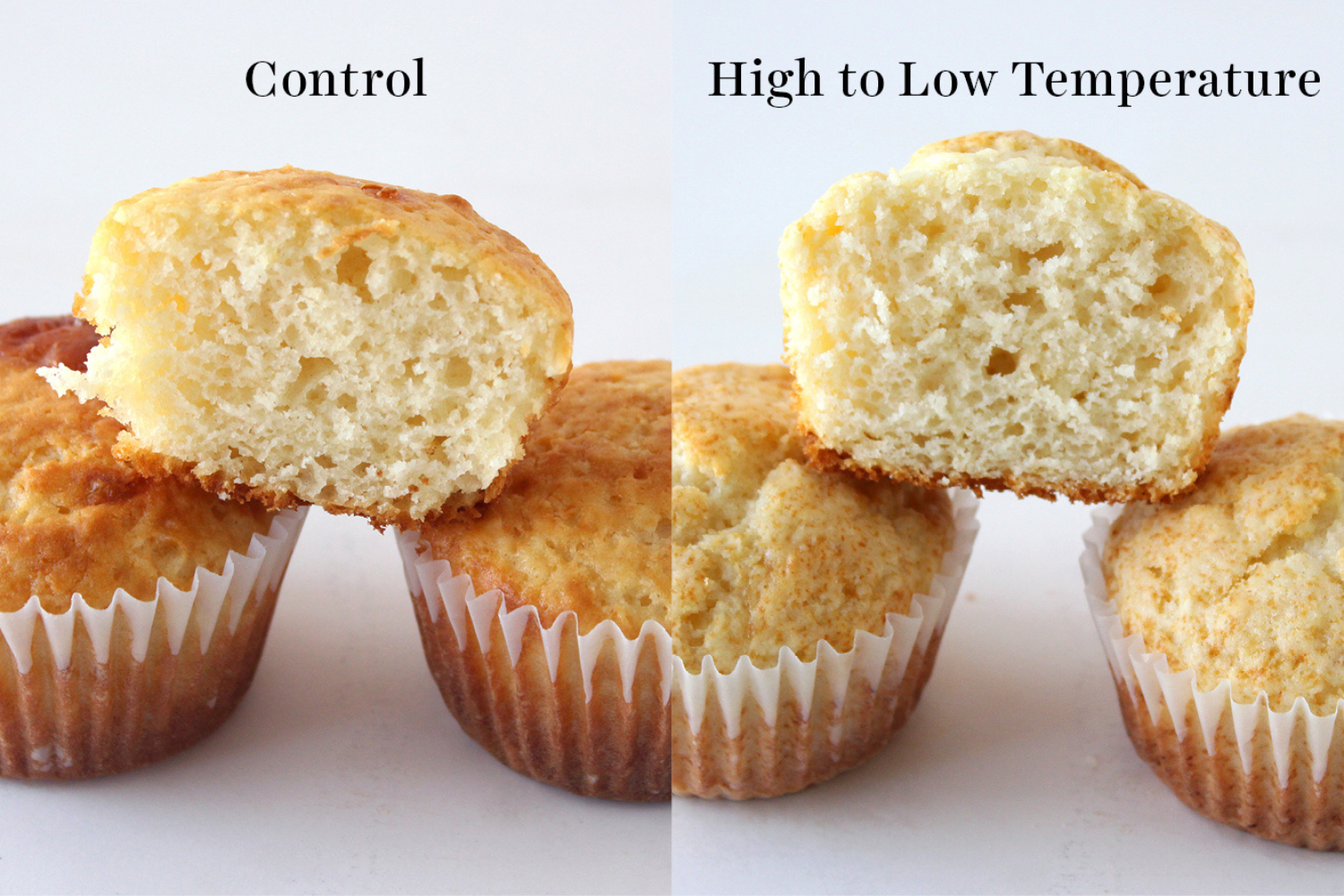
Directions for High-to-Low Temperature Muffin Baking
- Start off by baking for 5 minutes at 425°F, then turn the temperature down to 350°F and continue baking for 15 to 18 minutes. T
- hese muffins were beautifully tall, attractive, moist, and soft.
- This technique is great if you have a thick muffin batter, don’t have the time to allow your batter to rest overnight, and you trust your oven.
- This one isn’t my personal favorite because I find it annoying to mess around with the oven temperature while it’s baking. Not to mention if your oven is unreliable, this can be a challenging tip to follow.
- Or… if you’re like me and forget to turn the oven back down, this technique is a bit traumatizing when you accidentally ruin a batch of muffins!!
- That’s why in my Ultimate Muffin recipe, I prefer to bake at 400°F the entire time. You get more height than a lower temperature, just enough browning for slightly crisp buttery edges, but no risk of forgetting to turn the oven temperature down.
Option #3: Fill Your Muffin Tin Cavities with More Batter!
- Many muffin recipes instruct you to fill your muffin tin cavities two-thirds full. If you want taller muffins, fill three-quarters full or even all the way to the top of the pan.
- You may have less yield, but they’ll look more like beautiful bakery-style muffins with more distinct muffin tops.
- This works especially well with muffin recipes that yield 15 muffins. I’ll typically just split that batter between 12 muffin cavities in a standard pan. Then add a minute or two to the baking time to ensure they cook through.
- If you try this with a recipe that yields 12 muffins, you may only get 9 – but they’ll be beautifully tall!
BONUS TIP: Use your oven’s convection setting!
If you have one, using the fan setting can help to encourage your muffins to rise up nice and tall. Some convection ovens automatically adjust the oven temperature, but if yours doesn’t, be sure to reduce your baking temperature or you’ll overcook your muffins. Learn more about working your convection oven here.
Troubleshooting Flat Muffins
Why Didn’t My Muffins Rise?
- Make sure your leavening agents are fresh and effective. Sometimes they lose their leavening power even before the expiration date.
- Learn how to test your leavening agents for freshness here.
- Check your oven temperature with an oven thermometer. If it’s not hot enough, your muffins won’t rise well.
- Don’t undermix your batter. Sometimes I see people are so worried about overmixing (which will cause tough and rubbery muffins) that they barely bring the batter together. This doesn’t allow gluten to develop, which is the structural backbone to muffins.
Why Did My Muffins Sink?
- Your muffins may have been underbaked. If they weren’t set enough, they’ll sink as they cool.
- Try adding a few extra minutes to your baking time.
- You want a toothpick inserted to come out with a few moist crumbs attached.
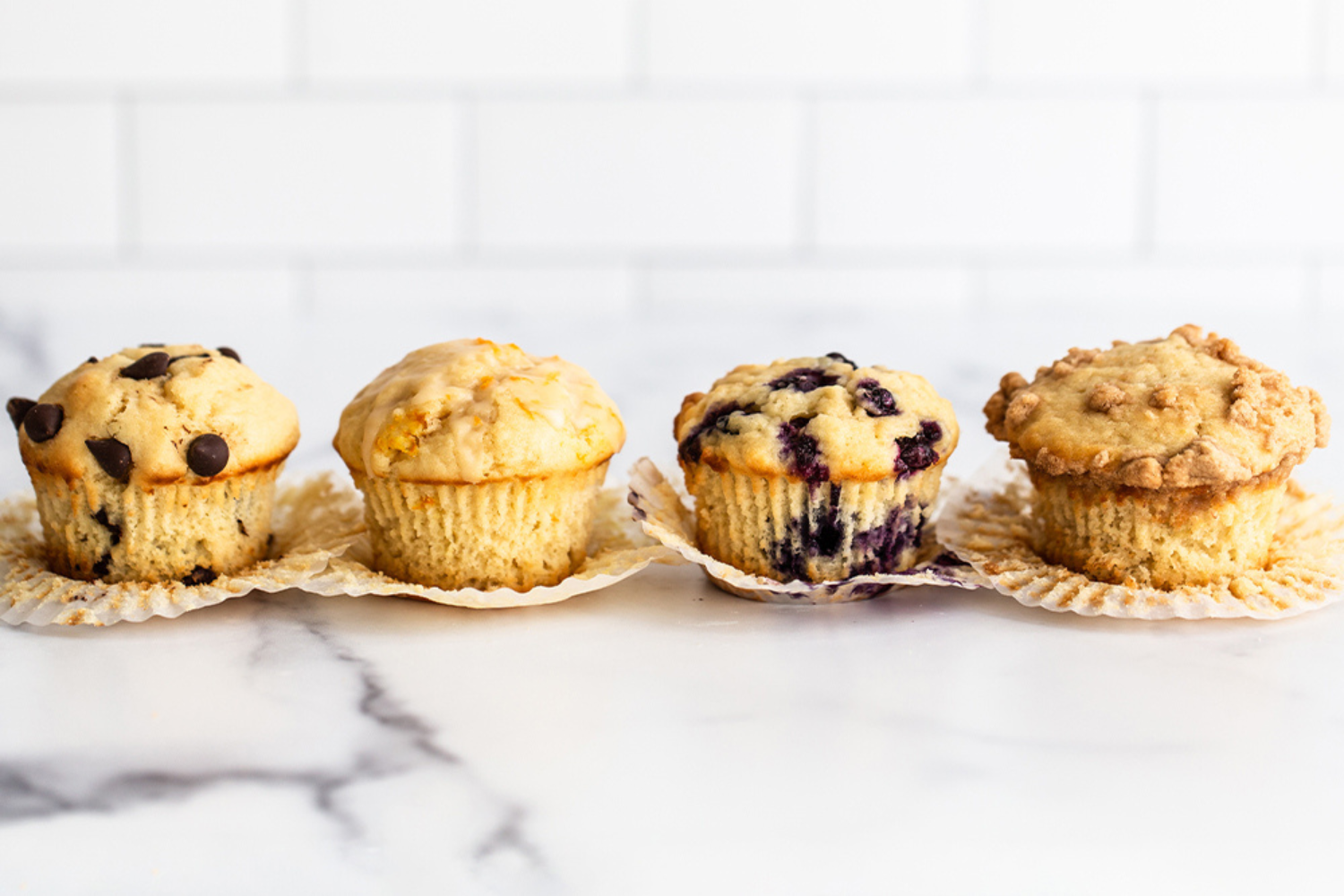
Delicious Muffin Recipes to Try:
- Ultimate Muffins
- Lemon Poppy Seed Muffins
- Brown Butter Blueberry Muffins
- Chocolate Chip Muffins
- Double Chocolate Muffins
- Chocolate Coffee Toffee Crunch Muffins
Photos by Ashley McLaughlin.
About Tessa...
I share trusted baking recipes your friends will LOVE alongside insights into the science of sweets. I'm a professionally trained chef, cookbook author, and cookie queen. I love to write about all things sweet, carb-y, and homemade. I live in Phoenix, Arizona (hence the blog name!)
Leave a Comment & Rating
Add a Review or Question
© Handle the Heat - handletheheat.com
Join the Handle the Heat Community
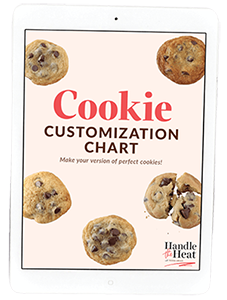
Instead of digging through cookbooks and magazines and searching the internet for amazing recipes, subscribe to Handle the Heat to receive new recipe posts delivered straight to your email inbox. You’ll get all the latest recipes, videos, kitchen tips and tricks AND my *free* Cookie Customization Guide (because I am the Cookie Queen)!



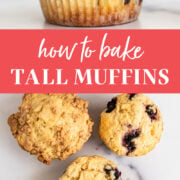
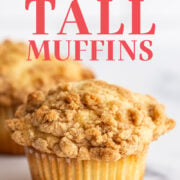
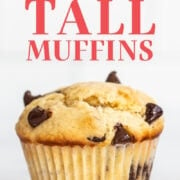

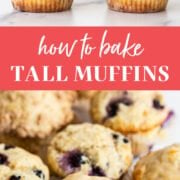


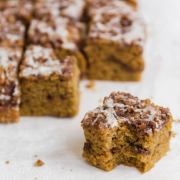
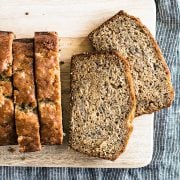
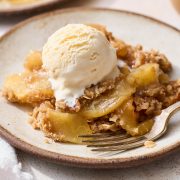

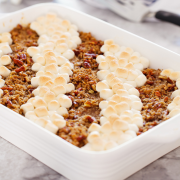
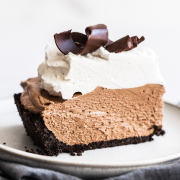
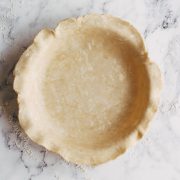
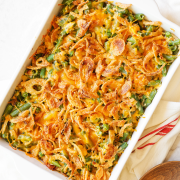
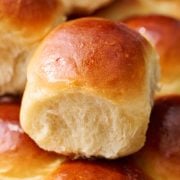
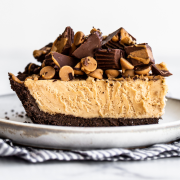
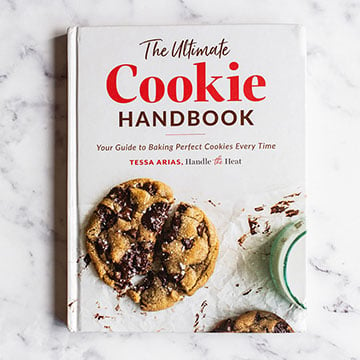
Hi! You mention adding fruit to the batter after the chilling process, but you don’t mention nuts. I’m thinking of making banana pecan muffins and was wondering if chilling the pecans along with the batter might soften them too much. I do plan on adding more on top of each muffin, but want the ones inside to taste their best too.
Hi Cynthia! I haven’t tried this trick on muffins with nuts in the batter, but I have a couple recommendations: try toasting the nuts and cooling them before adding to the batter (this will help improve crunch, and also makes the nuts taste even better!), or try Tessa’s recommendations for adding fruit just before baking, but using your nuts instead. I hope that helps! Let us know if you give it a try 🙂
thanks for all the tips!! Great tips for higher muffins.
If using frozen blueberries which have been coated in flour before adding to the mixture, can you rest the batter overnight or for a period of time before baking as they tend to bleed. Thank you.
Hi Jan! Tessa discusses the answer to your question in the pink tip box, above the recipe! Add fruit to the mixture just before baking, after the overnight rest. In the same section, Tessa also mentions how to prevent the fruit from sinking to the bottom! I hope this helps. Happy baking 🙂
Are there any adjustments needed when making jumbo muffins?
Hi Heather! We haven’t tried this with jumbo muffins, but I don’t see why this method wouldn’t work for those too! Just be sure that your recipe checks the boxes Tessa outlines in this article (double-acting baking powder, for example) and follow the instructions she outlines, and it should work perfectly. Happy baking 🙂
How long can the mix stay refrigerated? Does it have to be used the next day or can it be used a few days later like made in Sunday, Wednesday baked for fresh school muffins all week.
Hi Kendra! We haven’t tried refrigerating the muffin batter longer than an overnight rest, and I would worry that much longer than that would cause the batter to dry out, or even spoil if it’s left too long. Feel free to give this a try, but I would recommend baking the muffins after an overnight rest and then freezing the remaining muffins to enjoy throughout the week. Muffins freeze and thaw very well. I hope this helps! Happy baking 🙂
will the high heat method work for mini-muffins also?
Hi Tammy! We haven’t experimented too much with mini muffins, so if you give this a try, let us know how it goes 🙂
After letting the batter sit overnight in the fridge, Do You STIR The Batter Before Scooping into the muffin tin? Or Do You NOT Stir before scoopy?
Hi Rebecca! No need to stir unless you’re adding fruit. Just scoop and bake! Let us know what you think once you’ve given this method a try 🙂
We make a Hawaiian banana muffin with drained crushed pineapple. Should it be added after the refrigeration like any fruit?
Yes, definitely, Mike! Let us know how it goes 🙂
Great Information!!! Thank you! You addressed every question I had. I know this will help me a lot going forward.
Yay! So happy to hear that all of Tessa’s incredible tips were helpful to you, GeeGee!
In another recipe, ‘chocolate coffee toffee crunch muffins’, baking soda and baking powder are used. I would like to try this method for taller muffins. Seeing that baking soda is used in the listed recipe above, would it be possible to chill the batter overnight without the baking soda, then just before baking mix it in?
Hi Adecia! We have not tested mixing the baking soda into the batter the next morning after a refrigerated rest, and I imagine it would be difficult to ensure the baking soda was evenly distributed at that point without risking overmixing, resulting in rubbery muffins. Baking soda can lose a little of its oomf with a refrigerated overnight rest, but the main thing we have noticed in our testing is that muffins won’t brown as nicely when rested batter contains baking soda – but that’s not so much of an issue here, since the Chocolate Coffee Toffee Crunch muffins contain cocoa powder – so it would not be as noticeable anyway! I think as long as your baking powder is double-acting, and is fresh (learn how to test for freshness here!) you should hopefully still have nice, tall muffins the next morning. If you’re up for a little experimenting, I would also suggest making the muffin batter, and baking half the batch right away – then refrigerating the remaining batter and baking it off the next morning, to test the side-by-side results! Please let us know at [email protected] if you do experiment this way – we always love to see when people have fun with our recipes!! Happy baking 🙂
For the longest time I was convinced that using my convection oven was a no no. Lately I’ve been using it because the temp is more reliable than the regular setting. I’ve been getting great results. I do notice things are thoroughly baked sooner. I also have started using instant read thermometer for quick breads internal temperature.
Hi there! Convection ovens are definitely a great option for baking most things, but watch your temperature for sure. Tessa talks about oven temperature, and the importance of using an oven thermometer, in this article here! I hope that helps! 🙂
If I’m making zucchini or carrots muffins, should I add the veggies before baking or I can chill overnight too? I read your recommendations with fruit but you didn’t mention veggies.
Hi Brigitte! I’d be cautious of adding the veggies overnight due to the moisture content and would suggest adding them just before baking instead 🙂
Will the chill the batter overnight technique work with muffin mixes, like krusteaz?
Hi Kim! We haven’t tried using boxed muffin mixes, but I’d imagine that as long as baking powder is the only leavener, it’d work! Let us know how it goes if you give it a try!
Does the same process apply to gluten free recipes that use baking powder? I’ve heard the longer you wait to cook gluten free baked goods, the less gritty taste they have but am always afraid it will turn out flat.
Hi Melissa! We don’t bake gluten free, so I can’t say for sure! Let us know how it goes if you experiment.
I would like to know how to make a dome on muffin
Hi Doreen! Following our tips on this page should help you achieve beautifully domed muffins. Please let us know how it goes when you bake your next batch of muffins 🙂
In my experience, the viscosity of the batter is the main thing that determines how high my muffins rise. Thicker batters rise higher. I like to keep the water/milk-to-flour ratio low (about 2 parts water or milk to 3 parts flour by weight). Don’t skimp on the oil or eggs though, since these give muffins moisture and structure, respectively. I always add a tiny amount of xanthan gum too (about 1/16 tsp per 12 muffins). It works for me every time.
Thank out for all the great tips for baking muffins. Love all your recipes and have made lots.
Thank you for your explanation! I’m going to give this a try. I just wish I knew the secret to taller cupcakes vs flat ones. Any recommendations?
I loved this. I missed it the first time I was looking through your posts. I have tried the high to low temperature, but am not mindful enough :). I am going to try the refrigeration method. Thanks!
Let me know how your muffins turn out!
Thanks for the tips and the way you have explained all, either muffins or cupcakes no body can ignore but making them fine is matter of facts knowing about them and practice. Too yummy!
Farhat…https://www.bakingnfrosting.com/?m=1
Very Excellency. If you coverings in boxes.
I also noticed leaving them in the oven after turning it off and letting them cool down slowly helps to set the muffins better. Works well with vegan and gf recipes.
That’s great to know!
Interesting! I was always afraid that the baking powder would somehow become inactive once mixed and chilled or the eggs would go bad since they’re already at room temp. Thank you!
How long will the batter last in the fridge? Can you premake 2 days in advance?
As always, so useful!
I always thought I couldn’t keep muffin batter in the fridge overnight. I saw a friend do it one time, and her muffins were hard and dry. So I thought it was because of that.
Would this method work if you use any kind of oil, or melted butter? Just not when you use the creaming method, right?